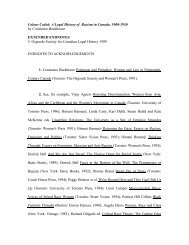Spring/Summer 2005 - University of Toronto Press Publishing
Spring/Summer 2005 - University of Toronto Press Publishing
Spring/Summer 2005 - University of Toronto Press Publishing
Create successful ePaper yourself
Turn your PDF publications into a flip-book with our unique Google optimized e-Paper software.
POLITICAL SCIENCE / ECONOMICSNAFTA Tax Law and PolicyResolving the Clash between Economic andSovereignty InterestsArthur J. CockfieldUnder the North American Free Trade Agreement(NAFTA), Canada, the United States, and Mexicocontinue to maintain their own distinct tax regimes,jealously guarding their sovereign right to do so. Attimes, these different tax systems harm the economicwelfare <strong>of</strong> the trade bloc by imposing barriers to crossborderflows <strong>of</strong> capital. In NAFTA Tax Law andPolicy, Arthur J. Cockfield analyses these different taxsystems and proposes a number <strong>of</strong> recommendationsto reduce the harm caused by these barriers.Cockfield argues that it is unrealistic to expectthe NAFTA countries to negotiate comprehensivereform efforts such as full-fledged tax harmonization.Rather, a strategy <strong>of</strong> heightened multilateraltax coordination is the appropriate solution as itpermits the countries to maintain national tax differences,but strives to smooth over many <strong>of</strong> theproblems created by the interaction <strong>of</strong> the taxregimes. The NAFTA countries should promotebinding arbitration for transfer pricing disputes,multilateral tax treaty negotiations, the elimination<strong>of</strong> parent/subsidiary dividend withholding taxes,and enhanced administrative cooperation to reducetax compliance costs for multinational firms. Onlythen can NAFTA function in the way it wasdesigned to.Arthur J. Cockfield is an associate pr<strong>of</strong>essor in theFaculty <strong>of</strong> Law at Queen’s <strong>University</strong>.Executive Styles in CanadaCabinet Structures and Leadership Practices inCanadian GovernmentEdited by Luc Bernier, Keith Brownsey, andMichael HowlettIPAC SERIES IN PUBLIC MANAGEMENT AND GOVERNANCECanada’s political regime is centred on the existence<strong>of</strong> a federal system <strong>of</strong> government within the institutions<strong>of</strong> Westminster parliamentary democracy.This system places a great deal <strong>of</strong> political power inthe hands <strong>of</strong> cabinet ministers, and while cabinetsystems <strong>of</strong> government in Canada have evolved atdifferent speeds in different federal and provincialgovernments, they have, over the last two decades,increased centralization <strong>of</strong> administrative and legislativecontrol in ever fewer hands.This shift has been well demonstrated byscholars such as Donald J. Savoie regarding the federalsystem, but little examined in the context <strong>of</strong>provincial governance. Executive Styles in Canadaplaces equal emphasis on both levels, explaininghow and in what way cabinet systems have conformedto or diverged from this general pattern.This unique collection is the only systematic, crossprovincialstudy <strong>of</strong> its kind, and is certain to be <strong>of</strong>great benefit to anyone interested in the structure <strong>of</strong>government in Canada.Luc Bernier is the director <strong>of</strong> l’École nationale d’administrationpublique.Keith Brownsey is a pr<strong>of</strong>essor in the Department <strong>of</strong>Policy Studies at Mount Royal College.Michael Howlett is Burnaby Mountain pr<strong>of</strong>essor inthe Department <strong>of</strong> Political Science at Simon Fraser<strong>University</strong>.Approx. 315 pp / 6 x 9 / May <strong>2005</strong>3 figures; 11 tablesCloth ISBN 0-8020-3581-7 £42.00 $65.00 EApprox. 320 pp / 6 x 9 / April <strong>2005</strong>8 figures; 1 tableCloth ISBN 0-8020-3952-9 £42.00 $65.00 EPaper ISBN 0-8020-3785-2 £20.00 $29.95 C45
















